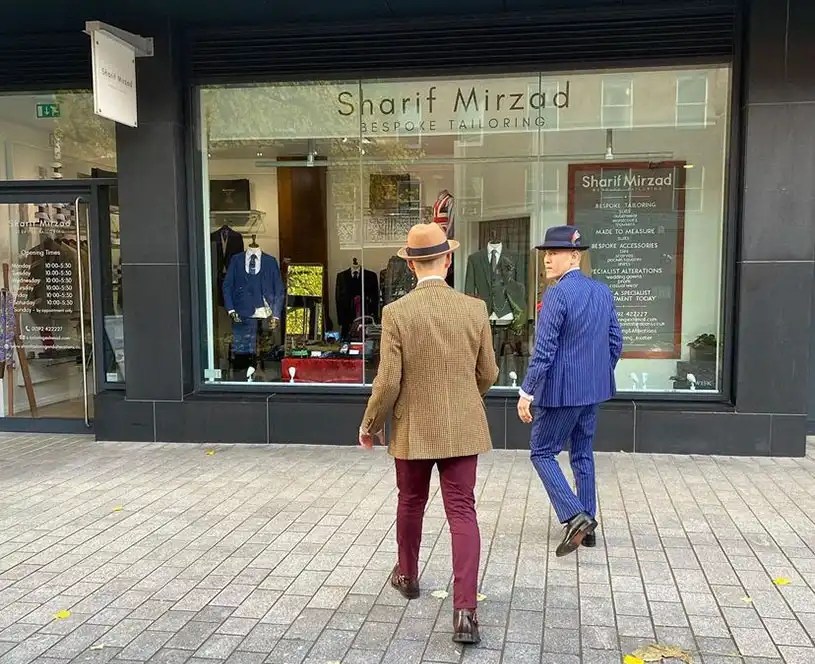What is sustainable fashion? And how can your business be more environmentally conscious? If you’re just starting out, or are looking to make a positive change in your small fashion shop, read on for tips and trends.
There’s a growing movement towards sustainable fashion and second-hand clothing, both in terms of new businesses and what consumers are searching for. With that in mind, Simply Business spoke to some small businesses about trends they’re seeing in their shops.
Bespoke tailoring
People are increasingly looking for ways they can adapt second-hand clothes or repair items to prolong their life. This could mean fixing a zip, resoling an old shoe, or altering a vintage skirt to their size.
To meet this demand, small fashion businesses may choose to offer a tailoring and repair service as well as selling their own clothing. Or they could start a small tailoring business like Sharif Mirzad in Exeter.
As owner of Sharif Tailoring, Sharif said: “We’re definitely seeing more clients dropping into the shop for things like restyling, relining and repairing their existing garments.
“Some clients are returning with things from their wardrobe which they had no idea could be tailored, others are bringing in second hand items which they would like to be fitted to suit them.”
He also said he’s seeing lots of university students wanting to tailor clothes they found in charity shops.

‘More in tune with the future of the planet’
It’s encouraging to see that people are also becoming more conscious about where they shop for clothes. Our recent poll on Twitter and Instagram reveals that 80 per cent of respondents are looking to buy more from sustainable brands.
Sharif believes this new mindset is being “championed by both the younger generation who are more in tune with the future of the planet, but also by people who see the benefits of having a capsule wardrobe.”
Businesses of any size are encouraged to think more about the circular economy, so from the product development phase, making sure that the design considers what happens to the products at the end of their life. This is known as the product life cycle.
For more sustainability tips for small businesses, read about OLIO’s journey as a food-sharing startup and what other businesses can do to reduce their impact on the planet.
‘The second-hand revolution’
Christine Timms has owned The Wardrobe, a small pre-loved dress agency in Welford on Avon, Warwickshire, for 40 years.
She said: “We’re welcoming new customers each week who are enjoying being part of the ‘second hand revolution’ – I’ve definitely seen an uplift in clients who are looking for good quality, second-hand garments and accessories.
“People want to save the planet, and small businesses like mine are leading the way. To us, second hand is second nature.”
While many businesses are seeing a surge in interest in second-hand items, our recent poll on Twitter and Instagram found that many people find it challenging to find what they’re looking for.
We found 64 per cent would still rather buy new clothing, and 60 per cent said they don’t find it easy to shop second hand.
Organic and vegan-approved clothing
If you’re marketing your business as environmentally-friendly, it’s important to be transparent about your materials and processes to avoid being labelled as ‘greenwashing’.
Greenwashing is defined in the Oxford English Dictionary as “misleading information disseminated by an organisation so as to present an environmentally responsible public image.” So as a business it’s important to be aware of sustainable fabrics, whether in their own clothing products or in products you stock in your retail shop.
Renu Assi, owner of Customized4You, said: “In our experience, consumers are willing to pay more for ethical fashion because they understand it costs more to put those standards and certifications in place. They can see the value in higher quality, longer lasting clothing.”
Nicola Walker, owner of Walker & Walker, said: “We make sure to source from brands who are people friendly – that means good working conditions for garment makers, no underage workers, and fair pay.
“We’re so delighted that SMEs like ours are leading the way in sustainable fashion.”
Read more guides for online shops and fashion brands
- 7 best apps to start selling clothes online
- How to start a clothing brand: the 9-step guide
- Brand identity: tips for designing and creating your brand
- Best sustainable packaging materials for small businesses
- What type of business insurance do I need?
Do you run a small fashion business focused on sustainability or second-hand clothing? Let us know your experience in the comments.
Looking for self-employed insurance?
With Simply Business you can build a single self employed insurance policy combining the covers that are relevant to you. Whether it’s public liability insurance, professional indemnity or whatever else you need, we’ll run you a quick quote online, and let you decide if we’re a good fit.
Photograph: Jacob Lund/stock.adobe.com
